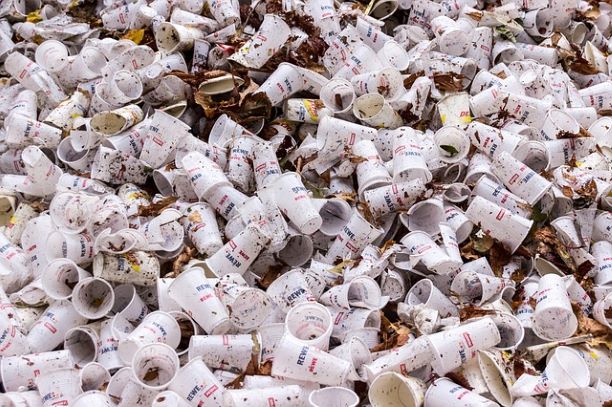

The cup of contention
Tamil Nadu Plastic ban–With blanket plastic ban coming into force from January 1st 2019, a voice of dissent has come from a slightly unexpected quarter. A state owned entity. Tamil Nadu Newsprint and Papers Limited (TNPL) is openly pushing back against the government’s decision to ban plastic coated paper cups. They seek exemption from the ban and say that the plastic cups have only 5 % of plastic used as a coating.
For TNPL, it is simple economics at play. It is the largest manufacturer of such cups producing about 60,000 metric tonnes (MT) per annum (5,000 MT per month) of cup stock and is one of the leading players in cup stock market in the country. Out of 5,000 MT per month produced, about 2,000 MT is marketed within Tamil Nadu, which has market volume of about 12,000 MT per month. Therefore, the ban will directly impact the sales of TNPL.
Also read: With Plastic Ban Across India Almost Complete, Challenge Shifts to Implementation
TNPL claims that its base stock is free of any plastic, the paper cup converter units give a plastic-coat with a tin film of food-grade low-density polyethylene (LDPE) to act as a liquid barrier for its end use.
TNPL has outsourced this to LDPE film coating units; there are over 20 LDPE coating units and 500 paper cup converters in the State providing job opportunity to around 15,000 people. Hence the ban will affect the livelihoods of these workers. If the plastic manufacturing factories closed, the State Government will suffer a Rs 2,500 crore loss every year adds KG Ramanathan, president, Indian Centre for Plastics in the Environment.
TNPL managing director S Sivashanmugaraja wrote to Environment and Forest Department on September 14 requesting an exemption of paper cups made from “recyclable, food grade certified LDPE coated multi-layer boards of 170 gsm and above” from the list of banned items.
An expert committee studied the compostable nature of the plastic-coated cup. This committee comprising S Selvan, Additional Chief Environmental Engineer of Tamil Nadu Pollution Control Board; Shrikant Y Shirali, Principal Director and Head of Central Institute of Plastic Engineering and Technology; SVR Krishnan, Executive Director (Operations) of TNPL and K Palanivelu, professor at Centre for Environmental Studies, Anna University, concluded that LDPE film on the paper cup is not biodegradable. Making an exemption for TNPL all the more difficult without opening up a pandora’s box of demands from other such affected bodies.
For instance, there is a another petition from the Tamil Nadu Packaged Drinking Water Manufacturers Association (TNPDWMA), to exempt water sachets from the ban. More than 470 packaged drinking water manufacturers, part of the association, moved the court seeking an exception. They say that their water sachet are above 50 Micron thickness, the minimum below which all packaging is banned, but they have still been banned from January 2019.
TNPDWMA claims that they plan to introduce recycling units across the state to recycle the sachets and have collection points in all districts to transport the sachets it to the recycling centres. This will stop the burning of water sachets which causes release of toxic fumes into the air, the main reason behind the ban.
While the government ban announcement was made in June this year, Tamil Nadu is seen struggling with plastic ban so far. Other states like Maharashtra have shown better resoluteness after the ban became effective in March this year. Maharashtra Pollution Control Board or MPCB member secretary E Ravendiran said there are indications that the country as a whole may come up with a model a few months from now that will fix responsibility on producers to collect, recycle and dispose of plastic wrapping scientifically under the Extended Producer Responsibility (EPR) principle. Scores of major FMCG brands were recently issued notices by MCPB to create a reserve fund (Rs 25,000 per 1 lakh multi-layer laminated packs) to create buyback and recycling chains and avoid pollution.
Though the use of plastic bags and other material has reduced considerably, but a plastic-free state still looks a distant dream. Several companies and local bodies are yet to ensure that used plastics are collected for recycling or disposal. But the onus of recycling now lying with the producer sure changes the commentary for big companies like Pepsico, Coca Cola, Nestle and Unilever, who are the biggest contributors to plastic pollution. Add to that politically connected groups like mouth fresheners and gutka makers with their small sachets that have managed to pollute every nook and cranny in large parts of the country, and you know the challenge will need more than government laws. Consumers will also need to support the effort by reducing, recycling on their own, or simply avoiding manufactures which seem to have no clear policy on collection and recycling.
For Tamil Nadu, a state that otherwise has a proud record on renewable energy rankings in India, one hopes that the plastics challenge also meets a similar response soon.
In a key step toward advancing clean energy adoption, Ahmedabad headquartered IRM Energy Ltd has…
Biofuels conglomerate Aemetis has announced that its subsidiary in India – Universal Biofuels – has…
The Greater Noida Industrial Development Authority (GNIDA) has commenced construction of a 300-tonne-per-day (TPD) bio-CNG…
The World Earth Day – with this year’s theme on ‘Our Power, Our Planet’ –…
In a significant step toward promoting decentralized waste management and clean energy, Tata Steel UISL…
Jaipur headquartered bioenergy player Rajputana Biodiesel Ltd has announced that its subsidiary, Nirvaanraj Energy Private…